|
|
|
Sort Order |
|
|
|
Items / Page
|
|
|
|
|
|
|
| Srl | Item |
| 1 |
ID:
163109
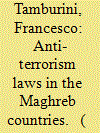

|
|
|
|
|
| Summary/Abstract |
This article sheds light on the counter-terrorism measures enacted by the Maghreb countries, with a comparative approach of the laws in Algeria, Mauritania, Morocco, and Tunisia. Carried out by comparing the Arabic and French original versions, the analysis revealed a common attitude that tended to preserve national security at the expenses of civil freedoms and human rights. In almost all cases, anti-terrorism laws strayed away from their supposed initial finality – fighting terrorism – tackling other issues such as the maintenance of public order or indirectly the control of dissidence and political opposition, with no or scarce legal checks and balances that could restrict possible police or judiciary abuses towards civil and political rights. The legal measures significantly delayed both the first transition to democracy in the region in the 2000s as well as the promising development after the ‘Arab spring’.
|
|
|
|
|
|
|
|
|
|
|
|
|
|
|
|
| 2 |
ID:
182475
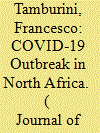

|
|
|
|
|
| Summary/Abstract |
North African nations, especially Egypt, Algeria, and Morocco, have been heavily affected by COVID-19 if compared to other African countries. Governments in North Africa took proactive legal measures to manage the virus threat, safeguarding population health, but also triggering repressive and invasive mechanisms that in some cases jeopardized basic freedoms and rights. This work will analyze comparatively the anti-COVID-19 legislations, pointing out how the legislative measures mirrored the level of transition of democracy, the opacity of some regimes, exploitation of the pandemic to foster repressive control, and highlighting the weakness of new democratic institutions unprepared to balance health security and democracy.
|
|
|
|
|
|
|
|
|
|
|
|
|
|
|
|
| 3 |
ID:
185143
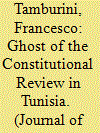

|
|
|
|
|
| Summary/Abstract |
The existence of a constitutional control is the essential cornerstone in any democratic system. Without a constitutional justice it is impossible to maintain a pluralist democracy with a real rule of law. The Tunisian constitutional history is emblematic of the relevance of the constitutional review. This article outlines the difficult and hampered life of the Tunisian constitutional justice that crossed two authoritarian regimes: a “revolution”; and the transition to democracy. It is in the latter phase that the creation of the constitutional court proved to be the paramount element in the passage from a procedural democracy to a substantive democracy.
|
|
|
|
|
|
|
|
|
|
|
|
|
|
|
|
| 4 |
ID:
193022


|
|
|
|
|
| Summary/Abstract |
The president of Tunisia, Kais Saied, recurred to Article 80 of the constitution on 25 July 2021 to proclaim the “state of exception,” freezing parliamentary activities, removing the representatives’ immunity, and dissolving the government headed by Prime Minister Hichem Mechichi. The following presidential decree 2021-117 on 22 September granted him legislative powers by decree, dismantling the constitution of 2014, which was the cornerstone of the result of the “Jasmine Revolution” of 2011. This article will analyze the constitutionality of the presidential decrees and shed light on the juridical, socioeconomical, and political circumstances that allowed Saied to perform what can be described as a constitutional coup or a self-coup, which reshaped the future of Tunisia.
|
|
|
|
|
|
|
|
|
|
|
|
|
|
|
|
| 5 |
ID:
172346
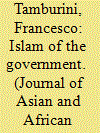

|
|
|
|
|
| Summary/Abstract |
Islam, in its relation between state and politics, has often been used to strengthen the sense of national identity or as a tool of self-legitimation by Arab regimes to gain the support of the people. This happened in Algeria, Morocco, Mauritania and Tunisia, where the state not only co-opted religion for official purposes but absorbed the ‘ulamā’, the religious establishment, in the administration as simple employees of newly created institutions, such as the High Islamic Councils. This article aims to shed light on these little-known organizations, one of the regime’s keystones to having a firm hold on their power.
|
|
|
|
|
|
|
|
|
|
|
|
|
|
|
|
| 6 |
ID:
168248
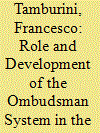

|
|
|
|
|
| Summary/Abstract |
The institution of the Ombudsman is aimed at defending values such as human rights and the respect for the rule of law against any form of abuse or arbitrariness. Many academic studies have been devoted to the Ombudsman in its different developments around the world, but not to the Maghreb area. This article wants to shed light on the characteristics of the Ombudsman in Algeria, Mauritania, Morocco and Tunisia. The comparative exam of the different North African Ombudsmen will point out how the institution was able to survive only in states where a transition to democracy was truly in place.
|
|
|
|
|
|
|
|
|
|
|
|
|
|
|
|
| 7 |
ID:
180690
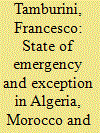

|
|
|
|
|
| Summary/Abstract |
This paper shows how the constitutional provisions related to the state of emergency and exception, although they are contained within democratic traditions, were set to operate in Algeria, Morocco and Tunisia as a mechanism of basic control and maintenance of liberal autocracies. The state of emergency model was used for the survival of regimes in times of instability and social unrest, leading in some cases to the suspension of human rights for many years. Nevertheless, these provisions were modified or lifted when the regime had to show a more convincing stake to the democratic process in 2011.
|
|
|
|
|
|
|
|
|
|
|
|
|
|
|
|
| 8 |
ID:
183684


|
|
|
|
|
| Summary/Abstract |
Contemporary Algeria was born after 132 years of colonization and a bloody decolonization war that lasted almost eight years. The official version and the dominant historical narrative of the war of independence has been influencing the state-owned media, the process of memorialization and the education system for years. This article will focus on how history was manipulated and used to legitimate political power using ordinary legislation as well as the highest source of law: the constitution. This article argues that by studying Algerian legislation and the various constitutional charters we can obtain key insight into ways in which the triad of the state, the party, and the army has been able to reproduce and re-appropriate symbols and narratives of the nation through constitutional measures and/or amendments.
|
|
|
|
|
|
|
|
|
|
|
|
|
|
|
|
|
|
|
|
|